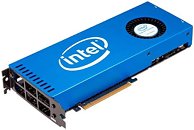Tuesday, May 8th 2018

Intel Could Unveil its Graphics Card at 2019 CES
It looks like Intel is designing its discrete graphics processor at a breakneck pace, by a team put together by Raja Koduri. Its development is moving so fast, that the company could be ready with a working product to show the world by the 2019 International CES, held in early-January next year. Intel's development of a graphics processor is likely motivated by the company's survival instinct to not fall behind NVIDIA and AMD in making super-scalar architectures to cash in on two simultaneous tech-booms - AI and blockchain computing.
A blessing in disguise for gamers is the restoration of competition. NVIDIA has been ahead of AMD in PC graphics processor performance and efficiency since 2014, with the latter only playing catch-up in the PC gaming space. AMD's architectures have proven efficient in other areas, such as blockchain computing. NVIDIA, on the other hand, has invested heavily on AI, with specialized components on its chips called "tensor cores," which accelerate neural-net building and training.
Source:
TweakTown
A blessing in disguise for gamers is the restoration of competition. NVIDIA has been ahead of AMD in PC graphics processor performance and efficiency since 2014, with the latter only playing catch-up in the PC gaming space. AMD's architectures have proven efficient in other areas, such as blockchain computing. NVIDIA, on the other hand, has invested heavily on AI, with specialized components on its chips called "tensor cores," which accelerate neural-net building and training.

38 Comments on Intel Could Unveil its Graphics Card at 2019 CES
You'll note I didn't say AMD employees.... :p;)Doing graphics is just doing math. That's why GPUs are so good for "mining". There's no patent on doing math equations in that way, and where there is, Intel has licenses for most of the tech they need that they don't outright own. There's no story to be told at all about any of that side of this.
It's not infriding tech of Nvidia or AMD. It's a free market and thus their ability to create a new GPU.
Intel owned the whole market for many years with integrated GPU's. This to delivery of complete motherboards and chips that dont need a discrete graphics card in the first place. But they still hold a great portion of desktop space market. It's just not suitable or even comparible with gaming in the first place.
It's just "2D" and some basic 3D. They have created some IGP's into their CPU's lately but they are not strong enough (esp with Vega and HBM) to compete in the first place.
Fail, learn from it, improve is the normal cycle.
If they are serious about GPU presence, I simply don't see what could stop them.
If there is a company on the planet which can enter consumer GPU market, it's Intel.I don't follow.
It's understandable to hate "x86 licensing red tape" (not that we would have real competition even if there were no licensing problems).
But hating it "because GPU is not limited", huh?
Intel actually paid nVidia and now pays AMD for GPU patents.